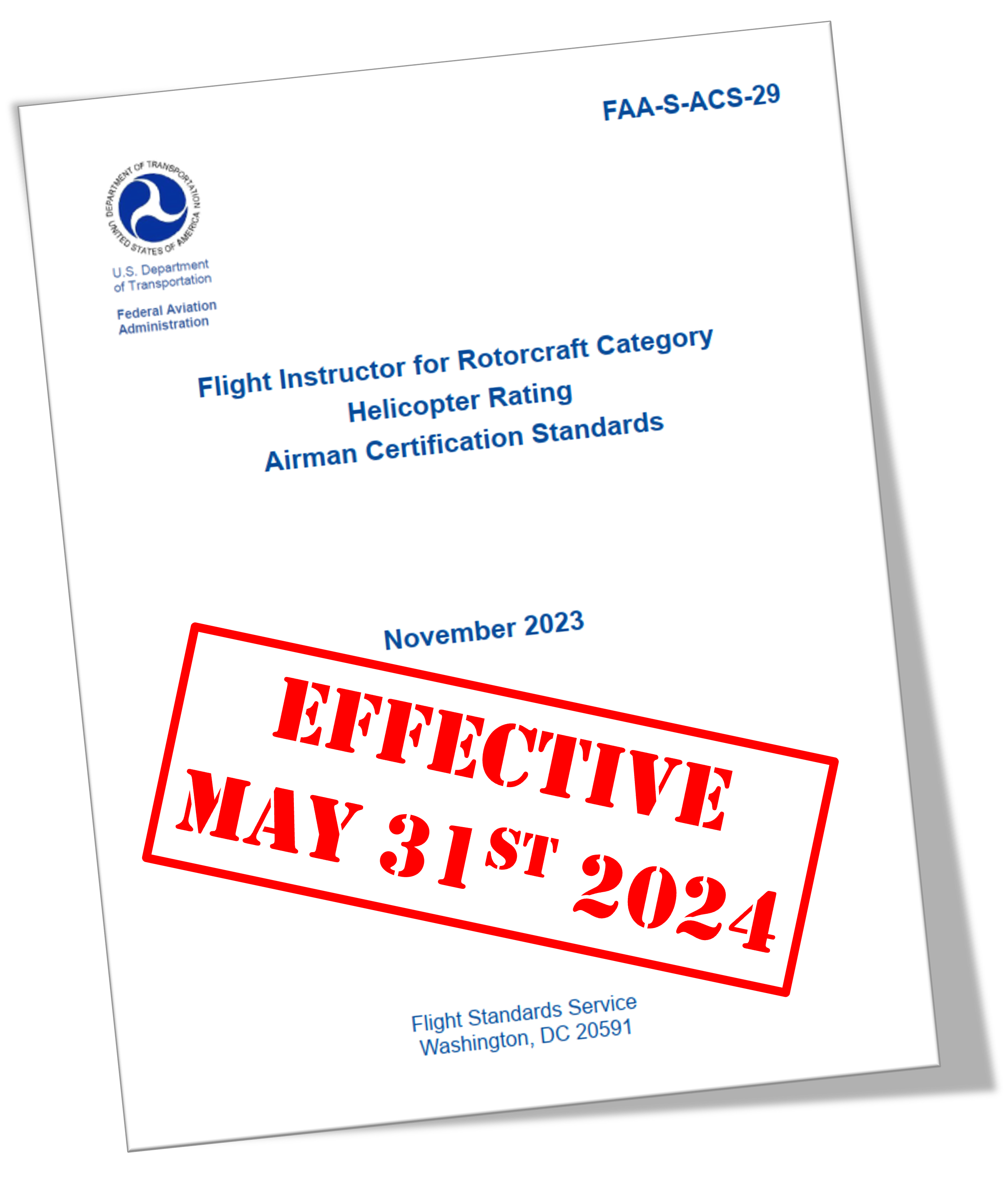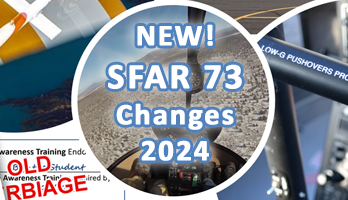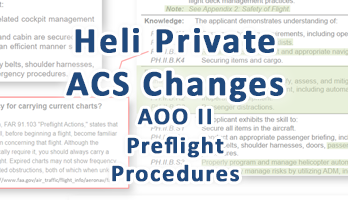Effective May 31st, 2024 the FAA Helicopter Flight Instructor (CFI) PTS (along with Private, Commercial, & Instrument) will be replaced by the new FAA Helicopter Flight Instructor (CFI) ACS (Airman Certification Standards). In this article we will cover the BIG changes from PTS to ACS for the Helicopter Flight Instructor.
- General ACS Changes
- Follow Along
- Helicopter ACS Flight Instructor (CFI), The BIG Changes Video
- Two New Instrument Tasks!
- Air Taxi Altitude
- Autorotation 300' AGL Rollout
- Flight Deck Management
- FOI Changes
- Technical Subject Changes
- Performance Maneuver Changes
- Teach Risk Management Elements
- Commercial Standards in CFI ACS
- Common Errors
- Many New Elements
- New, Renamed & Reordered Tasks
- More Info
- Feedback
General ACS Changes
But first, if the ACS is completely new to you, before reading the specific changes below check out our ACS overview article and ACS overview video covering the new ACS code system, task structure, required elements, changes to special emphasis areas, risk management and more.
Follow Along
If you want to follow along with the changes, grab the free PDF from the FAA’s ACS webpage or purchase the paper version (Amazon affiliate links to help support HTV) below. Paper versions also come with the ACS Companion Guide for Pilots (FAA-G-ACS-2).
Helicopter ACS Flight Instructor (CFI), The BIG Changes Video
Two New Instrument Tasks!
Yes, you read it correct – instrument tasks in the CFI (not CFII) checkride! Just like the new Helicopter Commercial ACS, the FAA have added these two new instrument tasks. But unlike the Commercial ACS, these tasks are not required, but may still be selected by evaluator.
These are really big changes, because most flight schools use R22 helicopters for Commercial and CFI training and most of them are not equipped to fly by reference to instruments. So that may mean a costly upgrade to include instruments like the GI-275 in the training fleet, or use of an R44 for part of the checkride. Any R22s upgraded to have an attitude indicator will increase safety, as going inadvertent IMC in a helicopter without an attitude indicator means almost certain death.
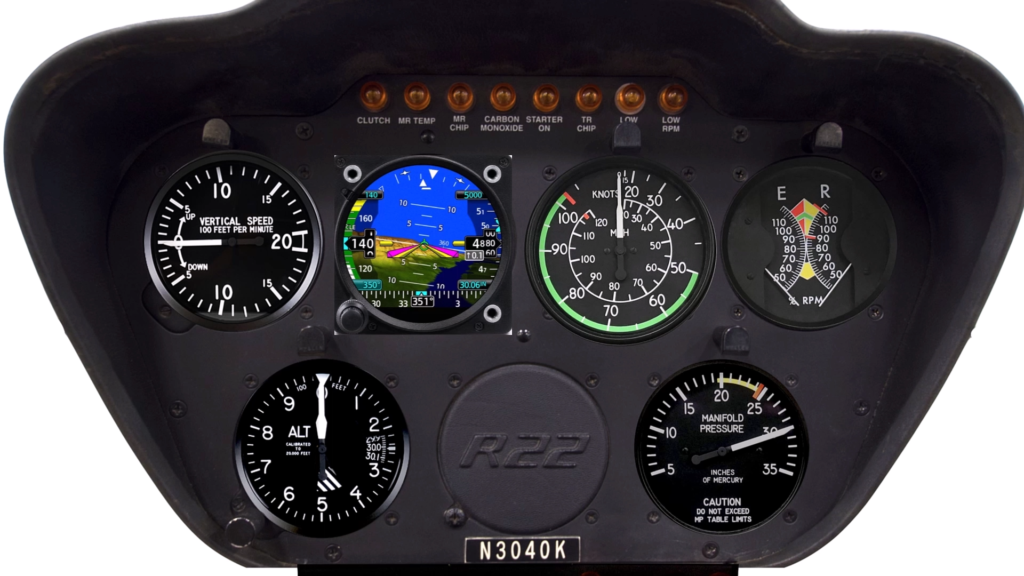
Task D – Flight Solely by Reference to Instruments
Task D is a basic exercise in flight by reference to instruments. It involves holding a constant airspeed (±10 knots) straight and level, holding altitude within ±200 feet and heading ±20°. The fun begins when you must make a constant airspeed climb and descent, wings level as well as with turns to a specific heading, stopping the climb/descent within ±200′.
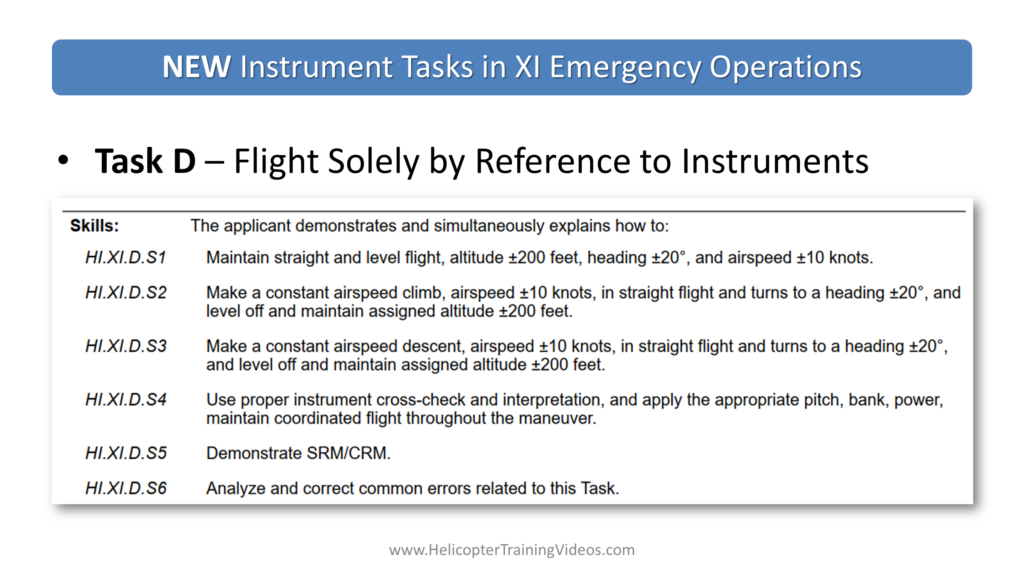
A good training exercise for this would be something like “Fly heading 180, maintain 5,000 and 60 knots“, once stable “Right turn heading 360, climb maintain 5,500 at 60 knots“. And then reverse “Left turn heading 180, descend and maintain 5,500 at 60 knots“.
Task E – Recovery from Unusual Flight Altitudes
Task E – if you have done your instrument rating or CFII this maneuver should be familiar to you. Recovery from unusual attitudes, one nose up and one nose down. There is also an Appendix 3 reference that reminds you not to do a push-over (mast bumping) or aggressive aft cyclic (causing an overspeed).
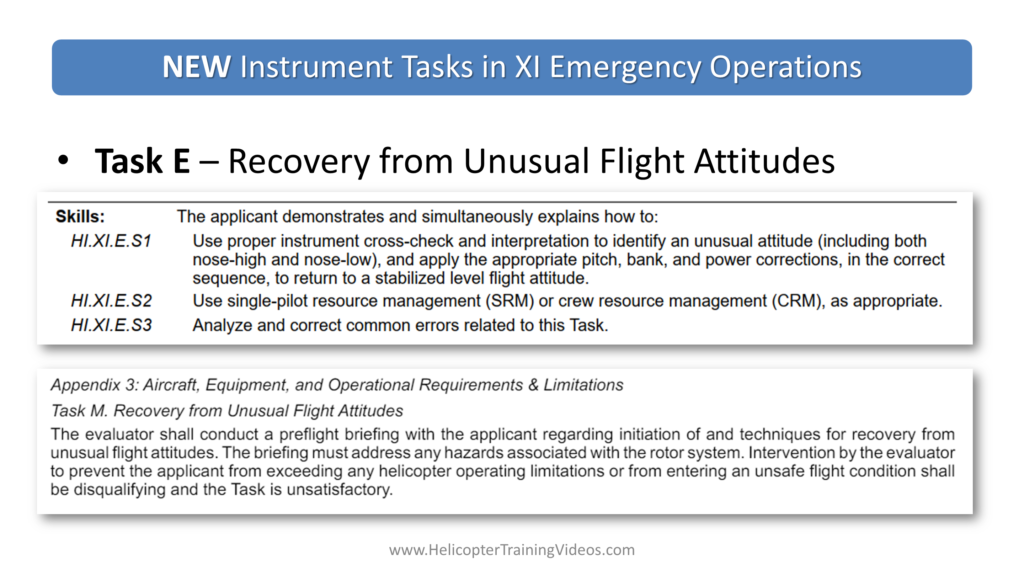
Air Taxi Altitude
The old CFI PTS was using Commercial PTS standards for maneuvers (although the numbers were not directly stated in the CFI PTS – see below). The new CFI ACS uses the new Commercial ACS standards (and now those numbers are directly stated) and the Commercial ACS changed the air taxi altitude target from ±5 to ±10 feet. But remember you still need to specify to evaluator what your target altitude is going to be (usually 40 feet).
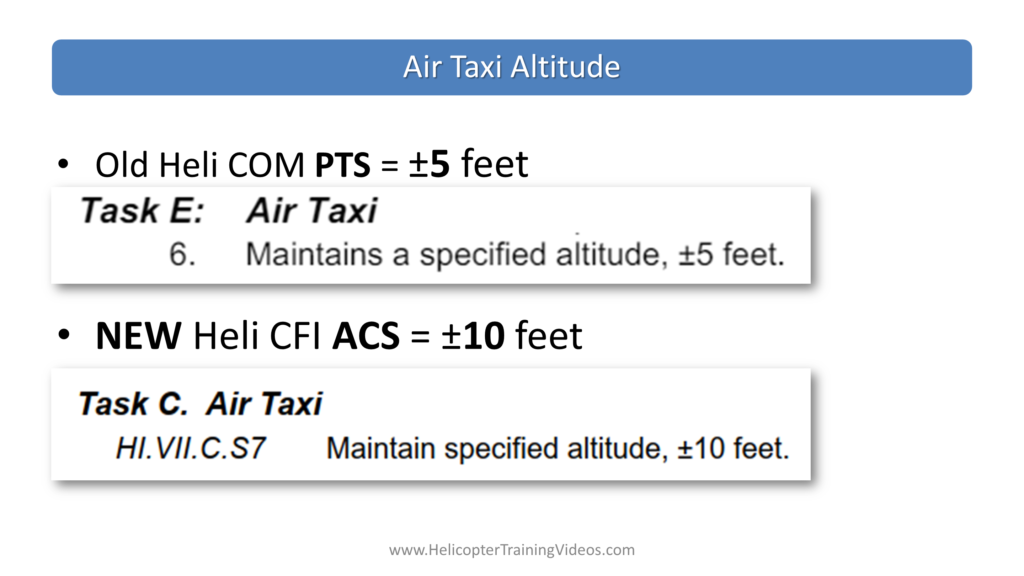
Autorotation 300′ AGL Rollout
The new Private, Commercial and CFI ACS all added a requirement to complete turns by 300‘ AGL for the 180 autos (renamed Autorotation with Turns). The ACS Appendix 2 (Safety of Flight) says that if the applicant fails to roll out of the turn by 300‘ AGL, the evaluator will require the applicant to initiate a power recovery and go around, and the task will be graded as unsatisfactory. It also requires a minimum entry of 700‘ AGL.
For many this will probably require an adjustment in training to enter at a higher altitude. Apart from the obvious improvement to safety, I think this is a good thing as a higher altitude entry will allow more time for the applicant to make adjustments to hit their spot.
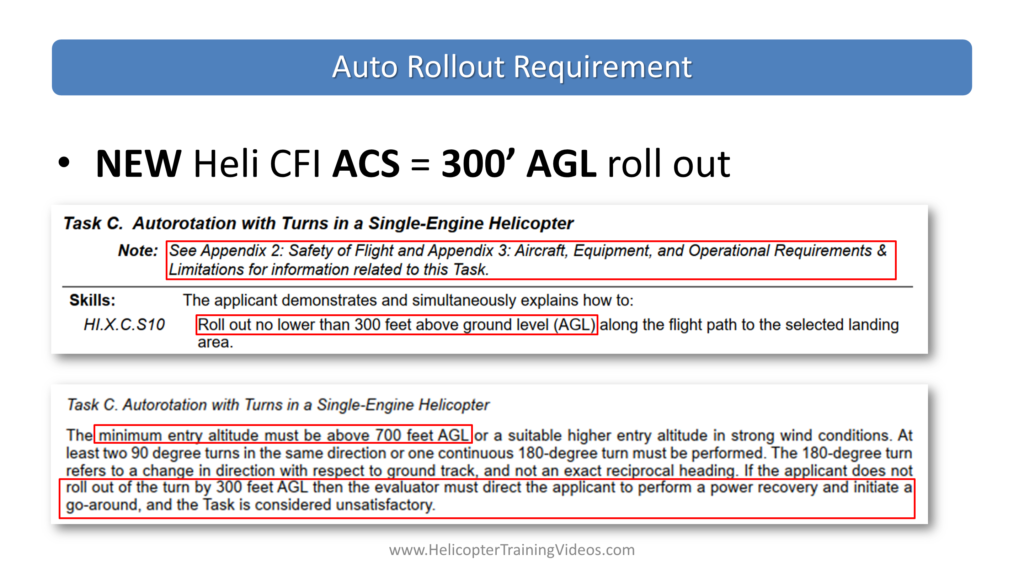
Flight Deck Management
The Flight Deck Management task replaces similar tasks in Private, Commercial and CFI ACS. In the CFI PTS the task was originally named Single Pilot Resource Management and much of the content itself is not too different. But the big difference is the note to Appendix 2, which says if the applicant fails to use ADM SRM/CRM on any task in the ACS, that task will will be unsatisfactory and the applicant will also get a Flight Deck Management unsatisfactory task too – bonus fail!
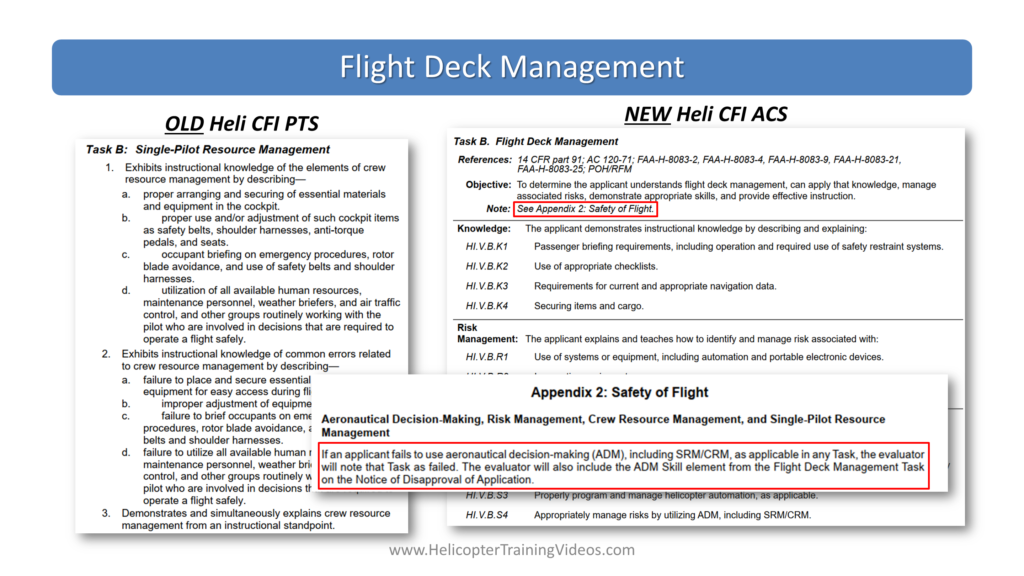
FOI Changes
In the Fundamentals of Instructing (FOI) Area of Operation there are many changes from the PTS version:
- Human Behavior task became Effects of Human Behavior and Communication on the Learning Process.
- The Teaching Process, Teaching Methods and Planning Instructional Activity tasks were consolidated into the new Course Development, Lesson Plans, and Classroom Training Techniques task.
- Critique and Evaluation task became Student Evaluation, Assessment and Testing.
- Flight Instructor Characteristics and Responsibilities task became Elements of Effective Teaching in a Professional Environment.
- A new task was added – Elements of Teaching that include Risk Management and Accident Prevention.
- The required tasks changed from at least Critique and Evaluation and Flight Instructor Characteristics and Responsibilities to now at least Elements of Effective Teaching in a Professional Environment and the new task Elements of Effective Teaching that include Risk Management and Accident Prevention and at least one other task. So at least 3 tasks in FOI now.
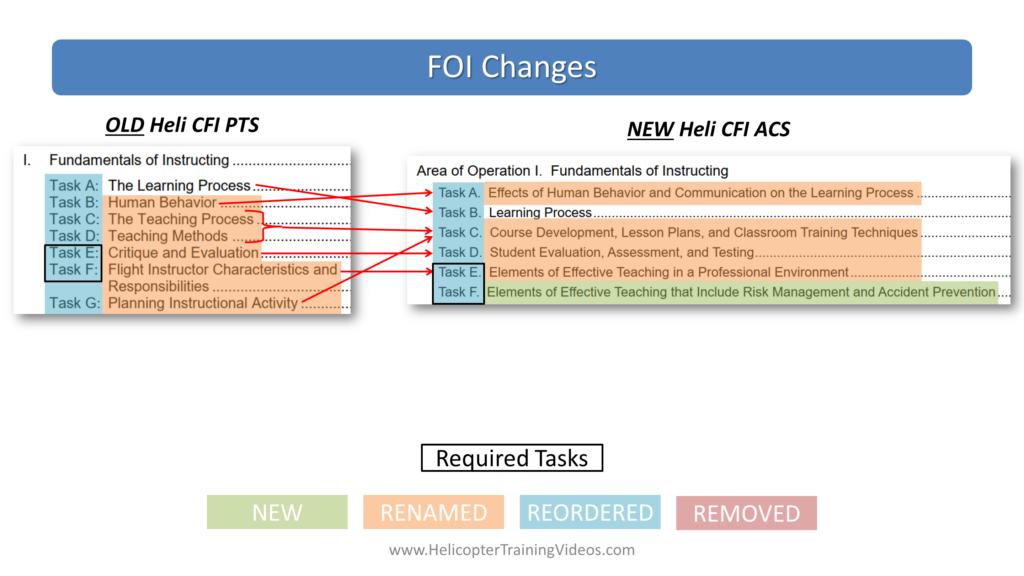
New Task – Elements of Effective Teaching that include Risk Management and Accident Prevention
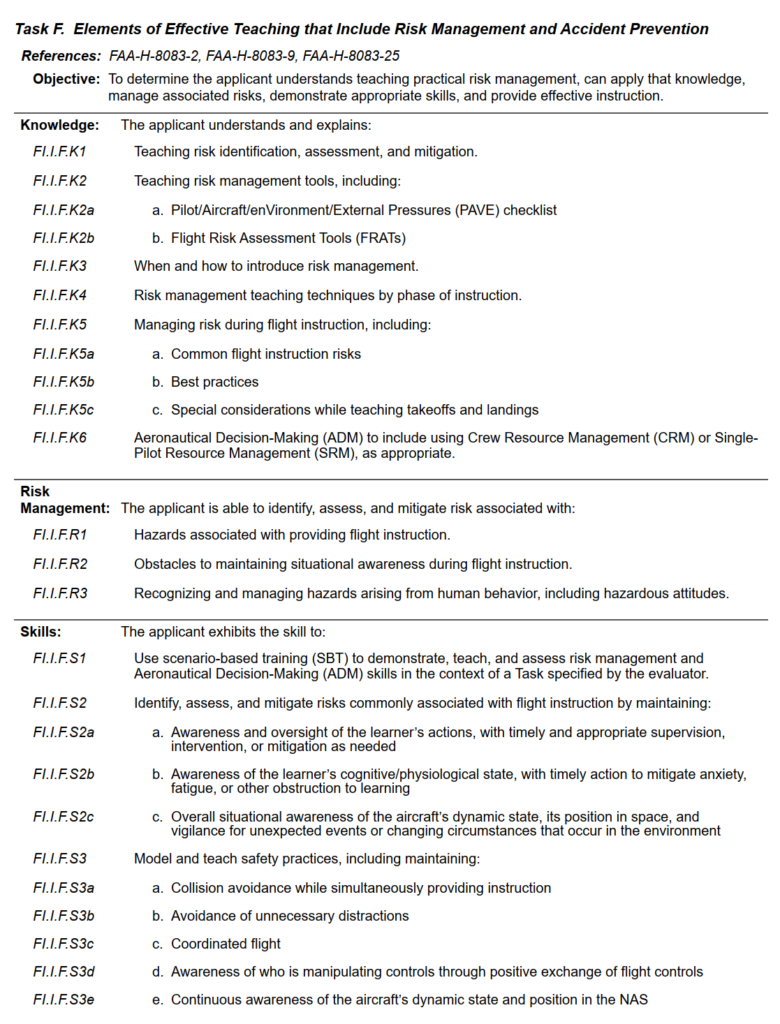
Technical Subject Changes
In the Technical Subject Area of Operation there are also many changes from the PTS version:
- Aeromedical Factors became Human Factors.
- Use of Distractions During Flight Training was removed and distractions elements are spread throughout the flight tasks.
- Helicopter Flight Controls becomes just Flight Controls.
- Helicopter Weight and Balance is moved into the new task Performance and Limitations (along with Performance & Limitations task moved from AOO III – Preflight Preparation).
- Navigation and Flight Planning becomes Navigation and Cross-Country Flight Planning.
- Regulations and Publications becomes 14 CFR and Publications.
- Airworthiness Requirements is removed from Technical Subjects into AOO III – Preflight Preparation.
- Logbook Entries and Certificate Endorsements becomes Endorsements and Logbook Entries.
- A new task Runway Incursion Avoidance is added.
- Another new task Operation of Systems is added from AOO III – Preflight Preparation.
- Nav Systems & Radar Services is also a new task.
- The required tasks has gone from at least Logbook Entries and Certificate Endorsements plus one other to at least Runway Incursion Avoidance (new task), Endorsements and Logbook Entries, plus one other. So at least 3 tasks in Technical Subject Areas now.
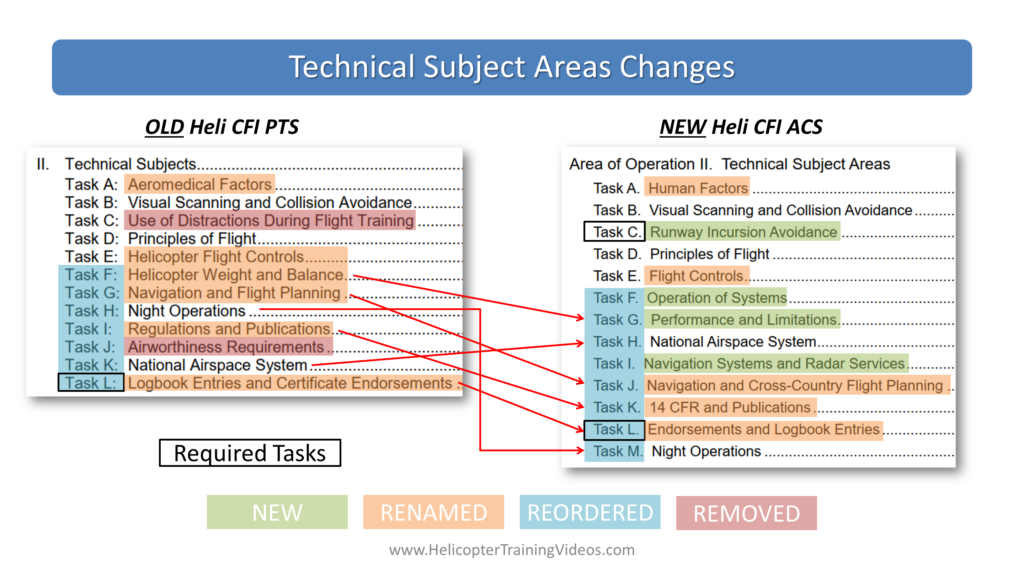
New Task – Runway Incursion Avoidance
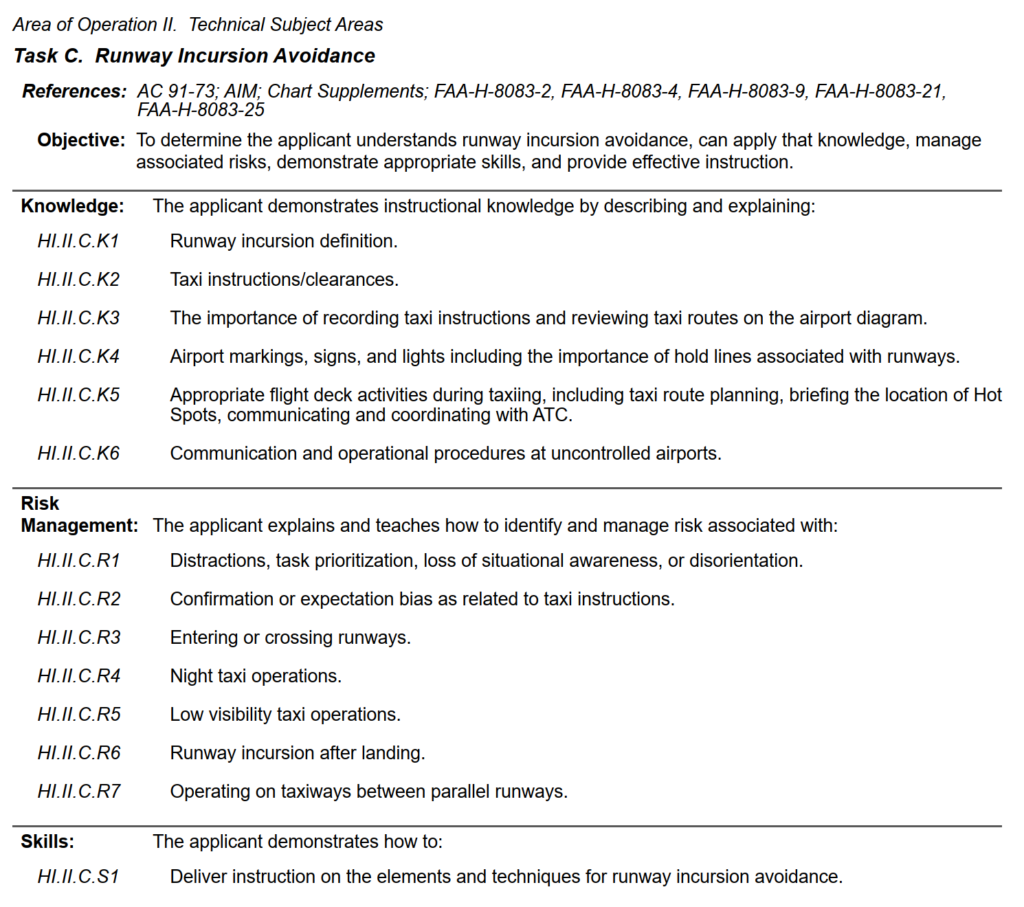
New Task – Navigation Systems and Radar Services
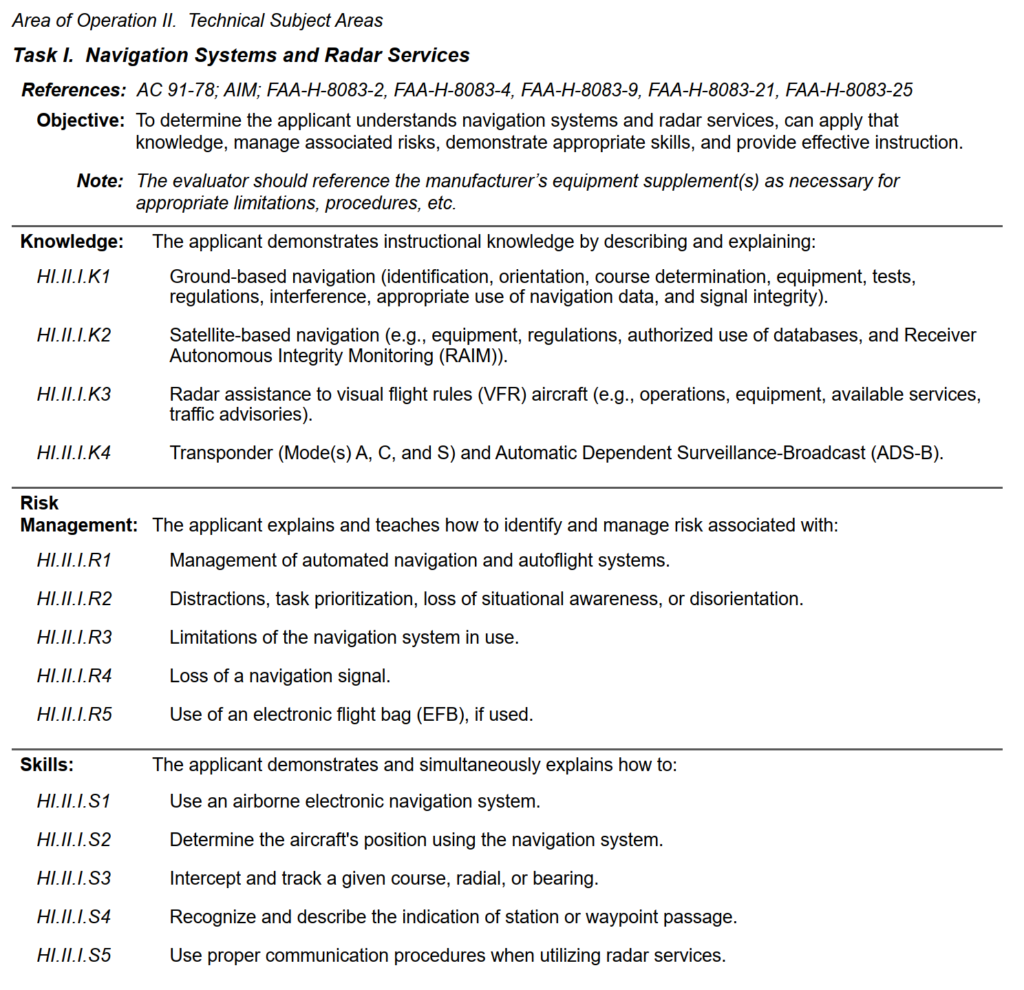
Performance Maneuver Changes
In Performance Maneuvers there are also changes from the PTS version:
- Rapid Deceleration became Rapid Deceleration/Quick Stop.
- Straight-In Autorotation became Straight-In Autorotation in a Single-Engine Helicopter.
- 180° Autorotation became Autorotation with Turns in a Single-Engine Helicopter. This added the clarification that it does not need to be one continuous 180° turn.
- The PTS required at least one task, the new ACS requires Task A (Quick Stops) and at least one other task. So now at least 2 tasks.
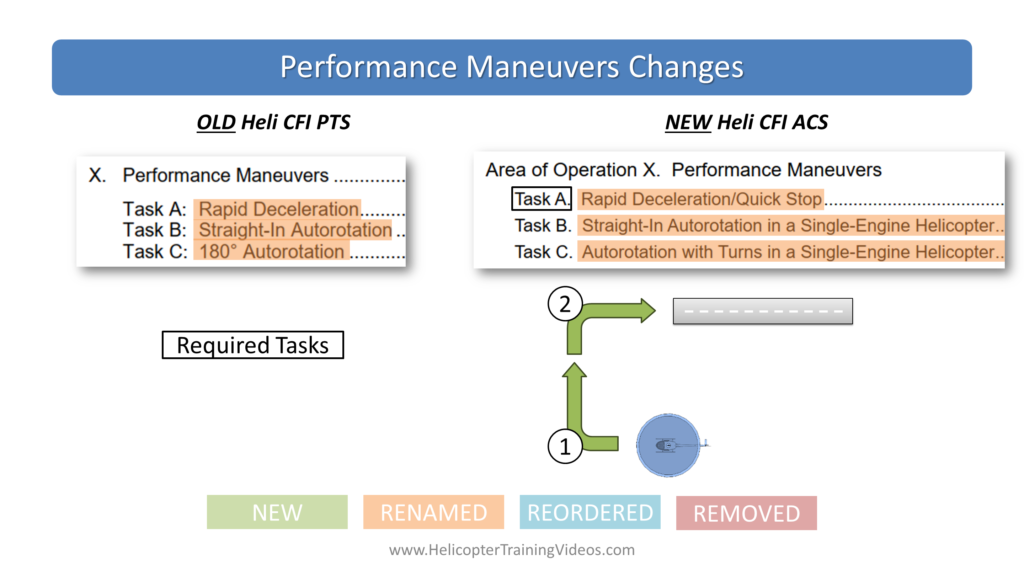
Teach Risk Management Elements
All the new ACS tasks now have a Risk Management section of new risk management elements. But in the CFI ACS you not only need to know how to identify, assess and mitigate those elements – you must also be able to “explain and teach how to identify and manage” those risks.
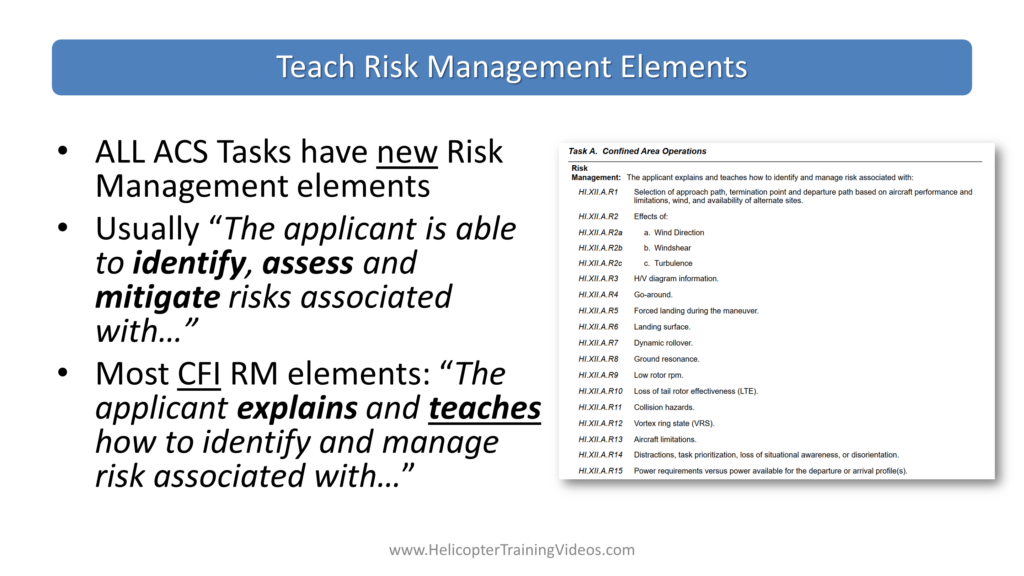
Commercial Standards in CFI ACS
As already mentioned (regarding Air Taxi changes) the CFI ACS now has specific standards (from the Commercial ACS) for each maneuver. In the old CFI PTS you had to go look up those standards in the sperate Commercial PTS document.
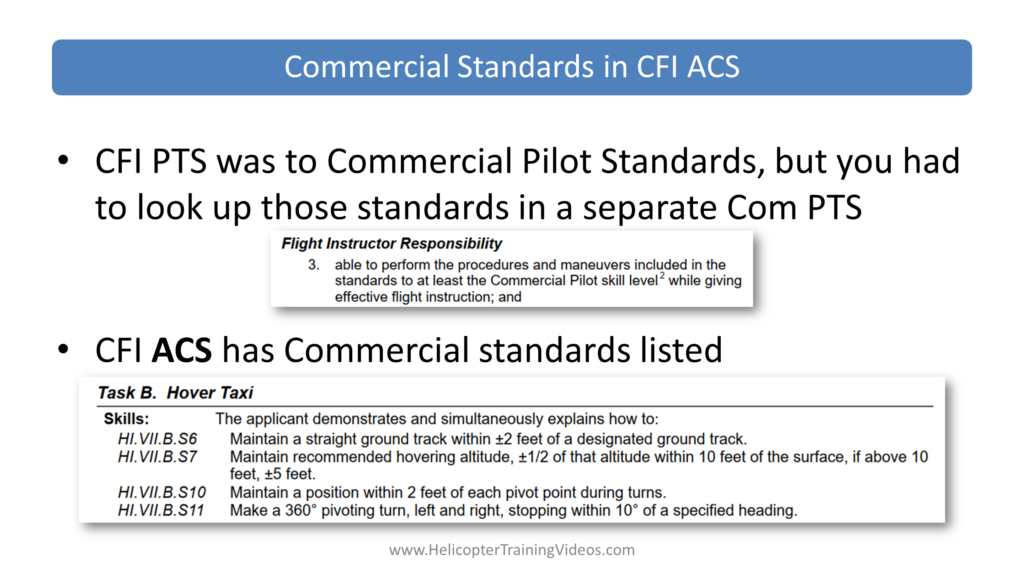
Common Errors
I would normally say get rid of the old PTS as you won’t need it anymore. But keep the CFI PTS for this reason – in the old CFI PTS it listed common errors related to a task. In the new CFI ACS, you will still be assessed on your ability to describe, explain, analyze and correct common errors, but with no list of what those should include. -So save your old CFI PTS or cut out those common error lists and staple them into the new CFI ACS.
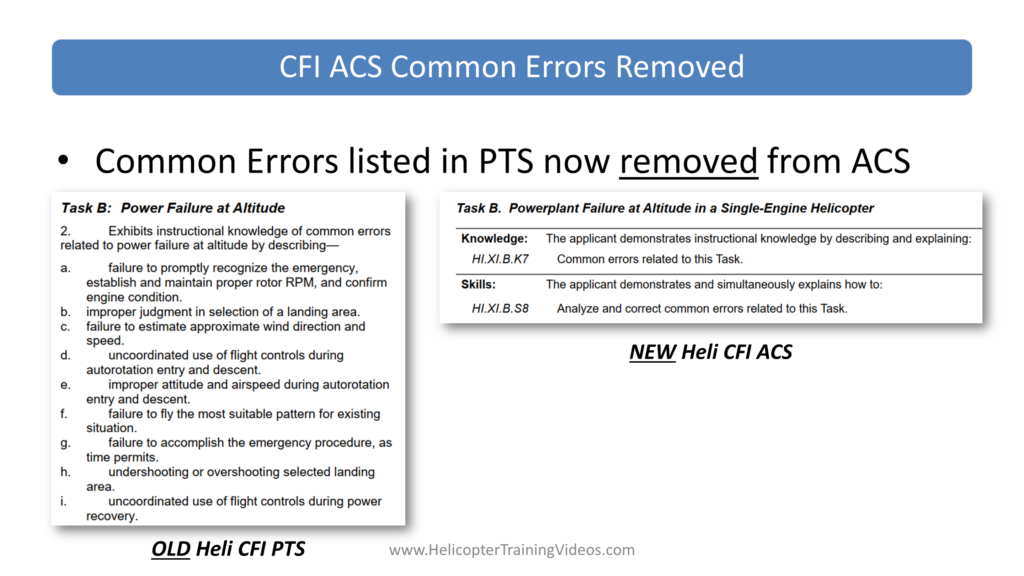
Many New Elements
All the new ACS have new elements, but the CFI ACS seems to have much more! Have a look at the Hover Taxi task below, compare the elements in the old PTS (5 instructional elements before we get to common errors) versus the ACS. The ACS Hover Taxi task has 9 knowledge elements (many completely new), 8 risk elements (all new) and 13 skill elements (mostly the same but more detail). So like I say for all these new ACS – read every line in preparation for your checkride!
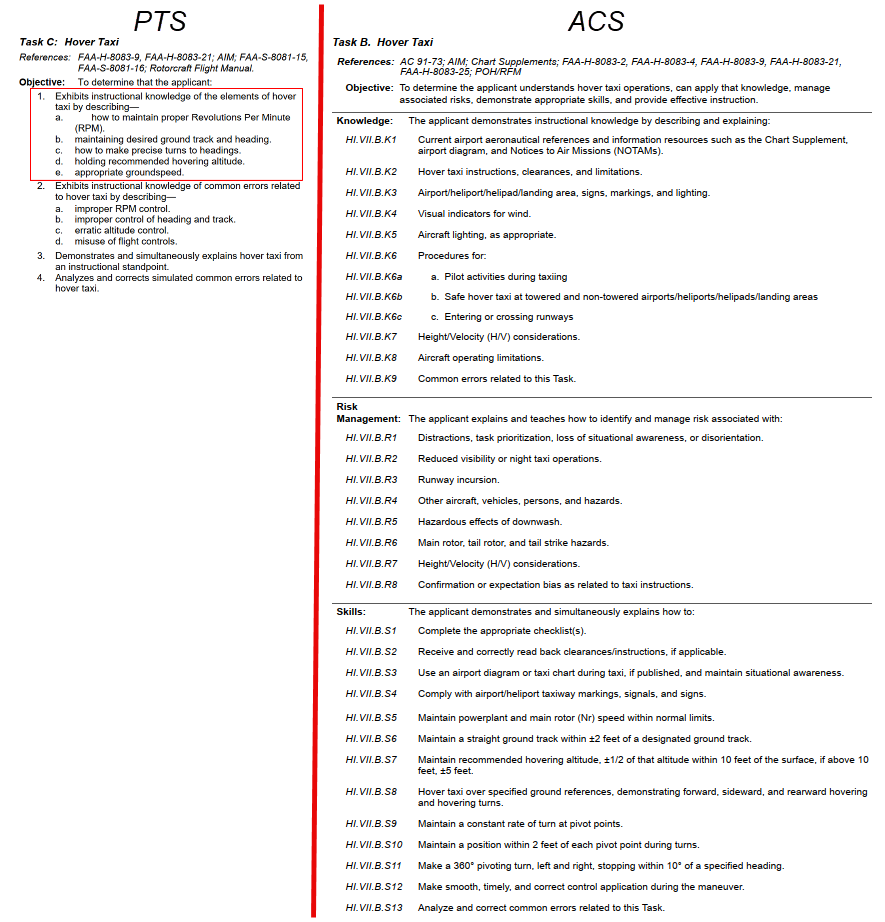
New, Renamed & Reordered Tasks
A big part of the changes from PTS to ACS is the renaming, reordering, removing and adding of tasks. The following is summary of the changes for the Helicopter CFI from PTS to ACS for each area of operation (AOO) except those already covered above (FOIs, Technical Subjects and Performance Maneuvers). This is just the task name & order changes – full details of what elements actually changed within every task will require you to read every line the ACS, as you should for full preparation for a checkride!
III. Preflight Preparation Tasks
Just like Private and Commercial ACS changes, Task A is renamed from Certificate and Documents to Pilot Qualifications because the task items that related to the aircraft certificates and documents were moved into the new Task B (Airworthiness Requirements) and Task A became pilot-focused Pilot Qualifications.
Operations of Systems and Performance and Limitations tasks were removed and added to the Technical Subjects, Area of Operations II.
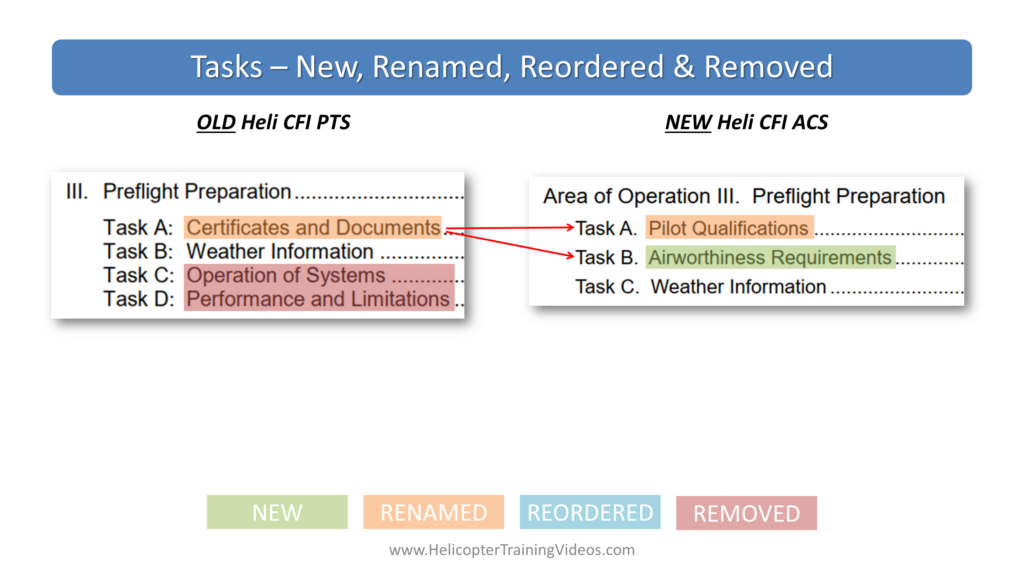
IV. Preflight Lesson on a Maneuver to be Performed in Flight
No task title/order changes here. But like all ACS tasks there will be new elements for you to review.
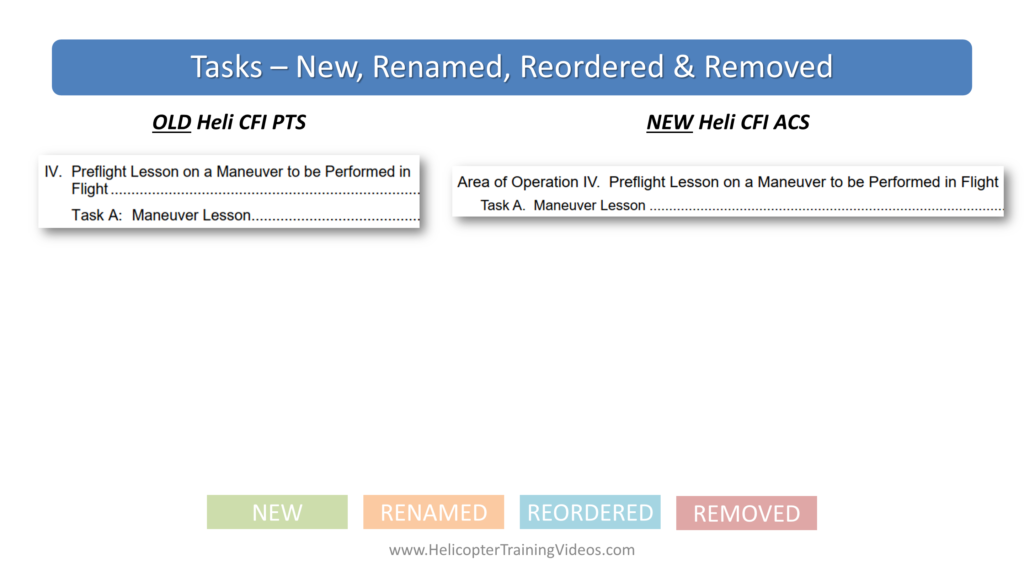
V. Preflight Procedures
Single-Pilot Resource Management becomes Flight Deck Management (already discussed above) and Engine Starting and Rotor Engagement becomes Powerplant Starting and Rotor Engagement.
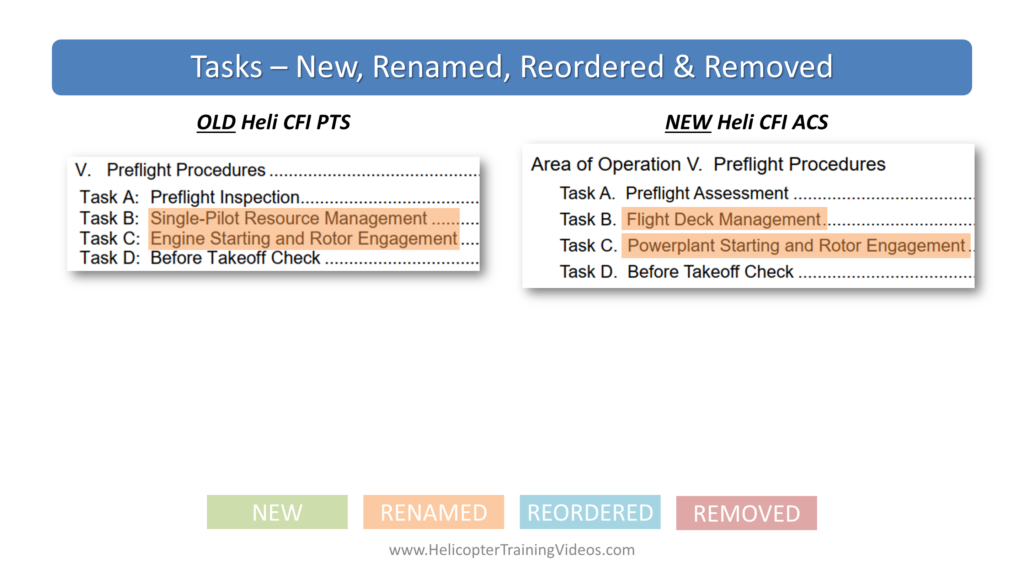
VI. Airport and Heliport Operations
Some order changes and title change of Radio Communications and ATC Light Signals to Communications, Light Signals and Runway Lighting Systems. Those Runway Lighting Systems includes the relatively new technologies of Runway Entrance Lights (RELs) which provide signal to aircraft crossing entering runway from intersecting taxiway and Takeoff Hold Lights (THLs) which provide signal to aircraft in position for takeoff. Make sure you read up on those to be able to teach what they are and how they work.
Airport and Heliport Markings and Lighting became Runway/Taxiway/Heliport Signs, Markings and Lighting.
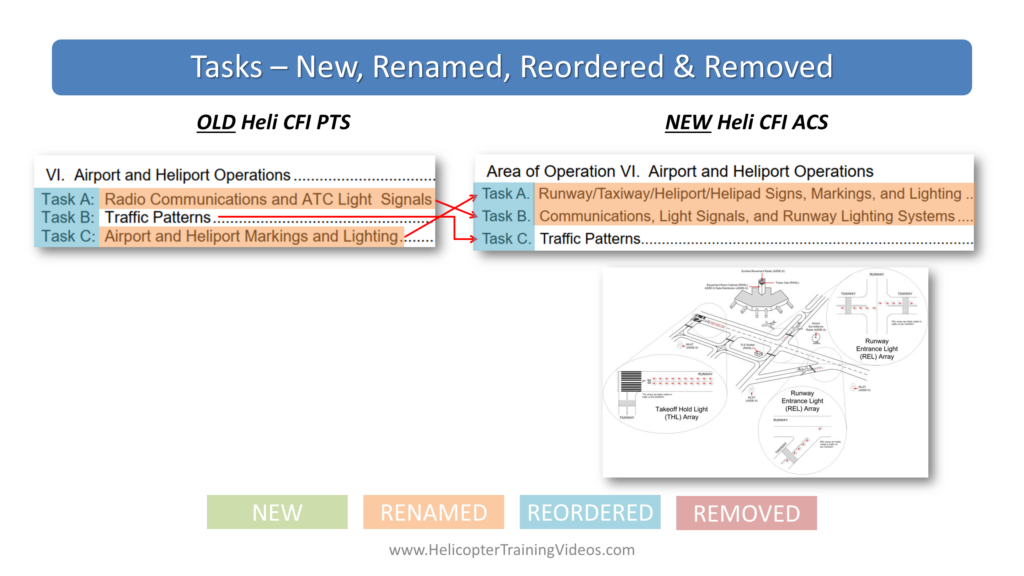
VII. Hovering Maneuvers
Some order changes and change of Surface Taxi to Taxiing with Wheel-Type Landing Gear.
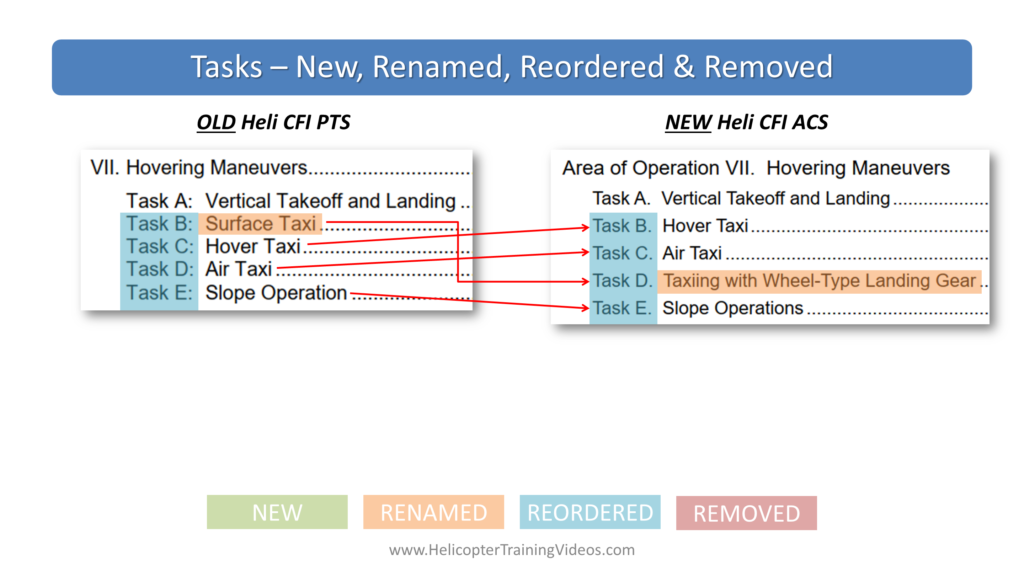
VIII. Takeoffs, Landings and Go-Arounds
Just like in Private and Commercial ACS changes they removed “Crosswind” from Normal and Crosswind Takeoff and Climb, despite the task still covering crosswind takeoffs and the approach task keeping “crosswind” in it’s title.
There were some order changes and Rolling Takeoff became Rolling Takeoff (Wheel-Type Landing Gear). They also removed the Approach and Landing Simulated Powerplant Failure – Multiengine Helicopter task and moved it to the Emergency Operations, Area of Operation XI.
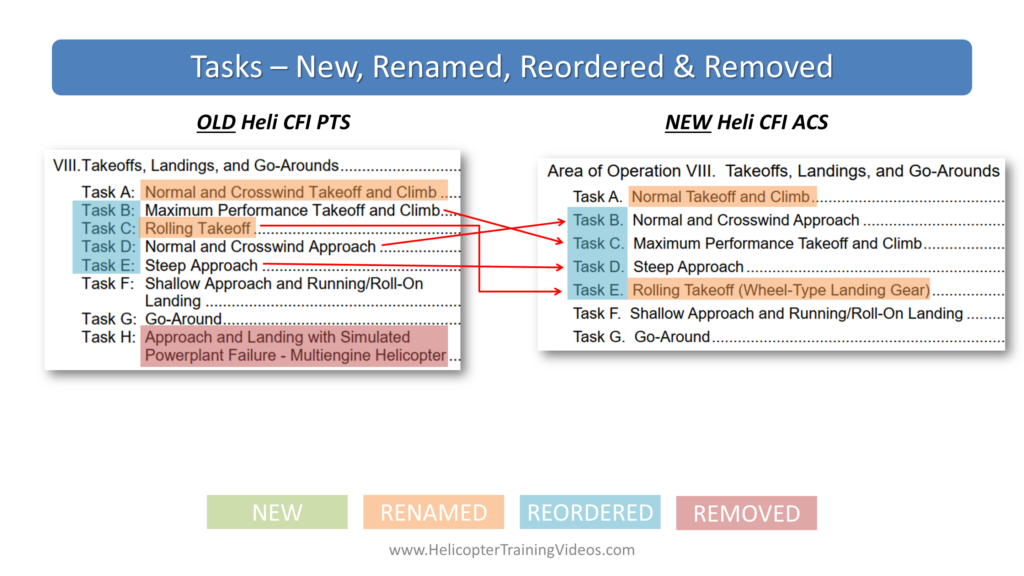
IX. Fundamentals of Flight
No task title/order changes here. But like all ACS tasks there will be new elements for you to review.
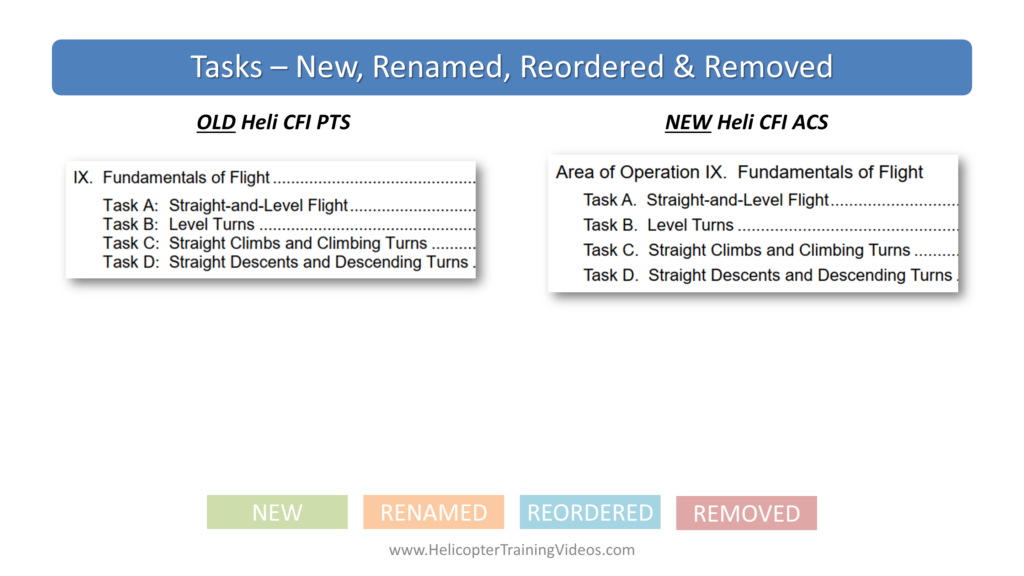
XI. Emergency Operations
A few changes to tasks in this area of operations:
- Tasks A and B – small title changes for clarification that those are for single engine helicopters.
- In Private, Commercial and CFI ACS:
- Settling-with-Power becomes Vortex Ring State
- Low Rotor RPM Recovery becomes Low Rotor Revelations Per Minute (RPM) Recognition and Recovery
- Low “G” Conditions becomes Low Gravity (G) Recognition and Recovery
- Approach and Landing with OEI (simulated) was added from the Takeoff, Landings & Go-Arounds area of operation.
- Two new simulated instrument tasks (already covered above) were added.
- Some changes to task order.
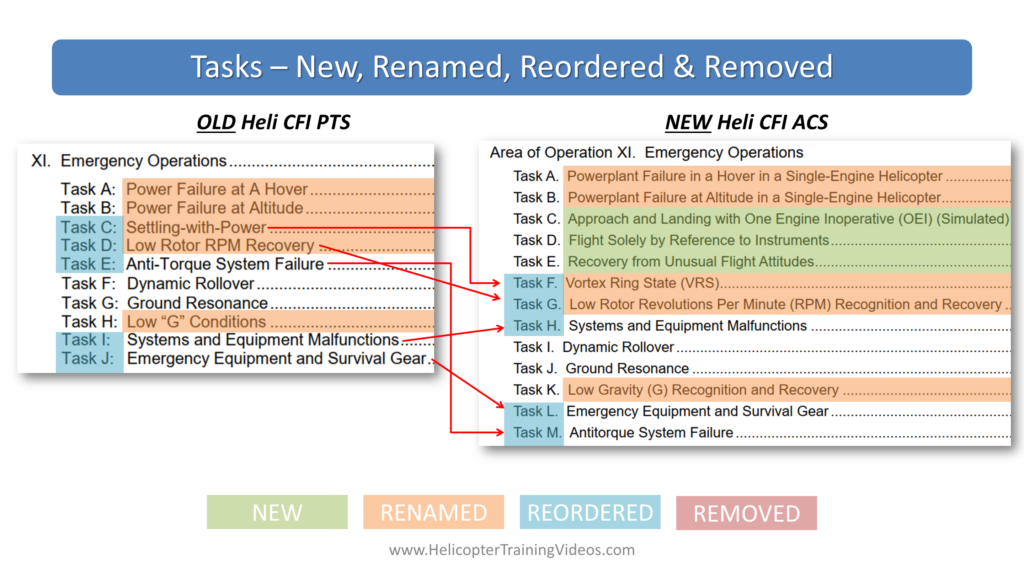
XII. Special Operations
Like in Private and Commercial ACS, the word “platform” was removed from the title, yet it is still part of the task.
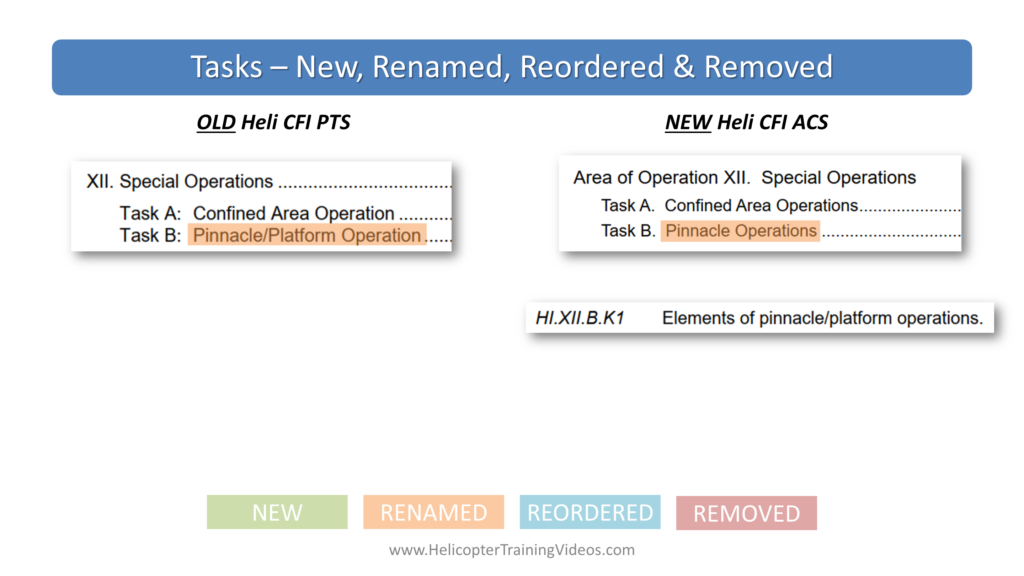
XIII. Postflight Procedures
The word “parking” was added to the title, but it is not a new element.
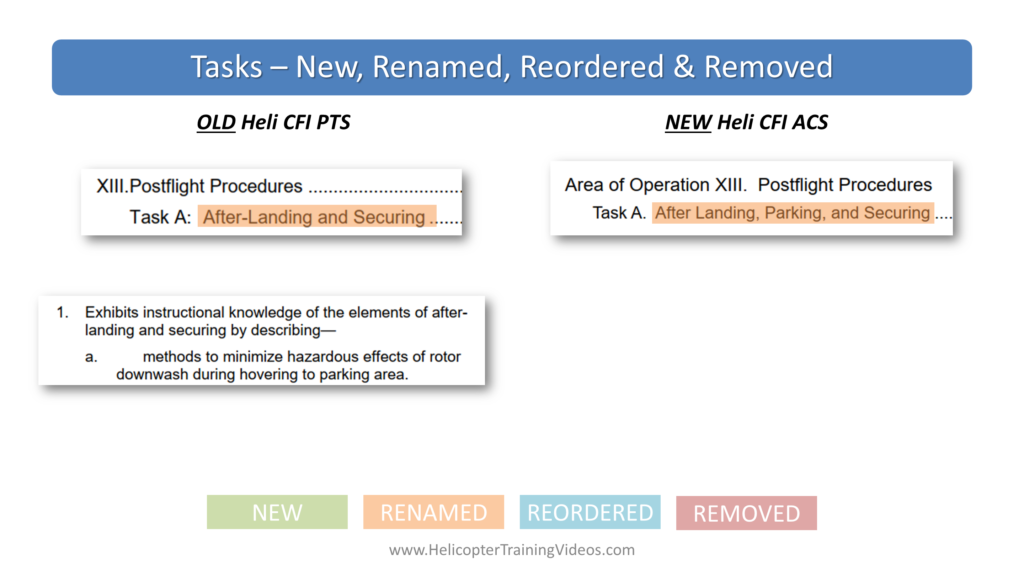
More Info
To learn more about the change from Helicopter PTS to ACS, check out the following:
- Helicopter ACS General Changes Video and article
- Helicopter ACS Playlist (Full Details for PVT, COM, INST & CFI Changes)
- FAA Airmen Certification Standards
- ACS Companion Guide for Pilots (Nov 2023)
- Short WINGS course on ACS
- LSR (PTS) Codes List
- ACS Tips for Evaluators (includes SBT ideas)
If you want to purchase the paper versions below are Amazon affiliate links that help support HTV. Paper versions also come with the ACS Companion Guide for Pilots (FAA-G-ACS-2).
DISCLAIMER – make sure you are fully informed on the latest regulations and their application.
For official guidance on laws and regulations, refer to your Certified Flight Instructor (CFI) or local Flight Standards District Office (FSDO) . Helicopter Training Videos aims to promote aviation knowledge and safety but makes no guarantees regarding accuracy or legal applications.
Feedback
What big changes to the Helicopter CFI ACS have you seen? Let us know using the comments form below:




